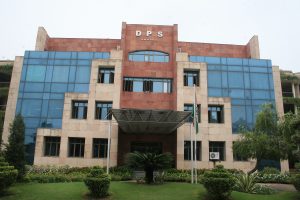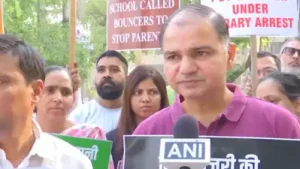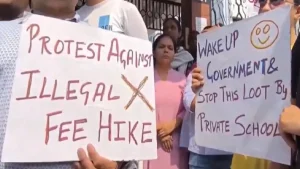New Delhi – In a significant development that has sent shockwaves through Delhi’s educational community, the Delhi High Court slams DPS Dwarka for what it termed as “shocking” and “inhumane” treatment of students. During a hearing on Wednesday, Justice Sachin Datta delivered a scathing critique of the prestigious school’s practices amid an ongoing fee hike controversy, describing the institution as a “money-making machine” that was treating students like “chattel.”

The Delhi High Court slams DPS Dwarka and court’s stern remarks came after reviewing an alarming inspection report submitted by an eight-member committee led by District Magistrate (Southwest) Lakshay Singhal. The report, dated April 4, revealed disturbing discriminatory practices against students whose parents had refused to pay the increased fees, which the school has been implementing consecutively from 2020 to 2025.
“This conduct is shocking,” Justice Datta remarked during the proceedings, expressing grave concern over the school’s treatment of its students. The Delhi High Court slams DPS Dwarka administration for segregating certain students, confining them to the library, and preventing them from participating in regular school activities—actions that the court deemed unacceptable in an educational institution.
Detailed Findings: How the Fee Hike Controversy Unfolded
The controversy for which Delhi High Court slams DPS Dwarka, stems from consecutive fee hikes implemented over the past five years. According to court records, the school increased its fees by:
- 20% in 2020
- 13% in 2021
- 9% in 2022
- 8% in 2023
- 7% in 2025
This cumulative increase has sparked significant protest from parents, many of whom have refused to pay the revised fees, citing financial constraints and questioning the justification for such steep hikes. In what appears to be retaliatory action, the school allegedly subjected students whose parents had not complied with the fee hike to discriminatory treatment.
The Delhi High Court slams DPS Dwarka for using these tactics as a means to pressure parents into paying the increased fees. As Delhi High Court slams DPS Dwarka, Justice Datta specifically noted that any issues regarding non-payment or deficit payment of fees must be addressed within the framework of the Delhi School Education Act, 1973, and associated rules, rather than resorting to methods that cause distress to students.
Inspection Report Reveals “Alarming State of Affairs”
An inspection conducted by a joint team comprising officials from the Department of Education (DoE), academicians, and the district magistrate revealed a deeply distressing situation at Delhi Public School (DPS), Dwarka. The findings outlined that some students were being kept isolated in the school library, barred from attending their regular classes, denied access to the canteen, and restricted from engaging with friends and peers. These practices were reportedly enforced due to non-payment of school fees, creating a punitive and exclusionary environment for the affected students.
Following the release of this report, Delhi High Court slams DPS Dwarka in strong terms for what it labeled as “a very alarming state of affairs.” The court criticized the administration’s handling of fee-related issues, particularly the treatment of students. In its remarks, Delhi High Court slams DPS Dwarka for crossing ethical boundaries by penalizing children for financial matters beyond their control.
Justice Datta observed that “the school in the guise of non-payment of fees is subjecting students to indignity and harassment,” a stance the court declared as wholly unacceptable. The court made it clear that such actions undermine the core values of education and student welfare.
As Delhi High Court slams DPS Dwarka repeatedly throughout the proceedings, it also emphasized that educational institutions must prioritize the dignity and emotional well-being of students over administrative or financial disputes. The court warned that such conduct could have long-term psychological effects on young minds. In a scathing observation, Delhi High Court slams DPS Dwarka for operating in a manner that violates students’ rights and fails to uphold humane standards of school governance. The revelations have intensified scrutiny of fee dispute policies across private schools in the capital.
In highlighting the school’s failure to protect the interests of its students, Delhi High Court slams DPS Dwarka not just for poor management but for its overall approach that, according to the court, “cannot be countenanced” in a civilized society. The findings have raised urgent ethical and legal questions about how reputed institutions are handling fee-related issues. Educational experts now call for regulatory reforms as Delhi High Court slams DPS Dwarka for what many consider a blatant misuse of authority.
With growing media coverage and public concern, Delhi High Court slams DPS Dwarka becoming a symbol of how schools must be held accountable when they compromise student dignity. The case has sparked citywide debates, and as Delhi High Court slams DPS Dwarka once again during follow-up hearings, stakeholders are calling for policy interventions to prevent similar occurrences elsewhere.
Overall, Delhi High Court slams DPS Dwarka sends a clear message: educational institutions must never allow administrative decisions to come at the expense of students’ basic rights and humane treatment.
Court’s Directives to Protect Student Rights
Recognizing the urgent need to safeguard the interests of affected students, the Delhi High Court slams DPS Dwarka with specific directives aimed at preventing further discrimination. The court ordered that the school shall:
- Not segregate students under any circumstances
- Not prevent students from meeting their peers, friends, and batchmates
- Not confine students to the library as a punitive measure
- Not prohibit students from visiting the canteen or accessing any other facilities on campus
- Not treat any student differently regarding academic or extracurricular activities
- Allocate appropriate sections to students who have not been assigned one yet
Additionally, the court directed the Department of Education and the district magistrate to conduct regular inspections of the school to ensure compliance with these orders and to take stern action in case of any violations.
These comprehensive measures reflect the court’s determination to protect the dignity and rights of students while the broader issues regarding fee hikes continue to be adjudicated in pending judicial proceedings.
Parents’ Plea Against Coercive Actions


The court’s intervention came in response to an application filed by parents seeking protection against coercive actions being taken against their children. These parents, who had challenged the fee hikes implemented by the school, alleged that their wards were being subjected to discriminatory treatment as a form of retaliation.
The Delhi High Court slams DPS Dwarka for these alleged retaliatory measures, with Justice Datta noting that using student harassment as “a device or means to recover any outstanding fees” was entirely unjustifiable. The court’s strong stance indicates its commitment to ensuring that educational institutions do not misuse their authority to pressure parents through their children.
Many affected parents have expressed relief at the court’s intervention, hoping that it will put an end to the discriminatory practices and allow their children to continue their education without facing harassment or indignity within the school premises.
Historical Context: Previous Interventions
This is not the first time that DPS Dwarka has come under scrutiny for its practices. The current hearing is part of an ongoing legal battle that saw a significant development on July 30, 2024, when the HC intervened in a plea moved by the school and stayed a notice issued by the National Commission for Protection of Child Rights (NCPCR).
The NCPCR had directed the Dwarka Deputy Commissioner of Police (DCP) to register an FIR against the school under the Juvenile Justice (Care and Protection of Children) Act, 2015. This directive was issued based on serious allegations that the school had:
- Expelled students for non-payment of increased fees
- Published the names of defaulting students on the school website
- Failed to assist a female student during her menstrual cycle
The Delhi High Court slams DPS Dwarka for these past actions as well, suggesting a pattern of behavior that the court finds deeply troubling. Justice Datta’s remarks to the Department of Education that they should “criminally prosecute the principal” underscores the severity with which the court views these allegations.
Implications for Delhi’s Private School Ecosystem
The strong stance taken by the Delhi High Court slams DPS Dwarka sends a clear message to other private schools in the National Capital Region about the legal and ethical boundaries they must respect when dealing with fee-related disputes. This case has significant implications for the broader private education sector in Delhi, where fee hikes have been a contentious issue for years.
Many education activists and parent associations have long argued that private schools often implement unjustified fee increases without adequate transparency or accountability. This case might serve as a precedent, establishing that schools cannot resort to discriminatory or coercive measures against students as a means to enforce fee payment, regardless of the merit of their financial claims.
The court’s intervention also highlights the role of regulatory bodies like the Department of Education in ensuring that schools adhere to established norms and protect student welfare. The directive for regular inspections and strict action against violations indicates a push toward greater oversight of private educational institutions.
Expert Opinions on the Court’s Intervention
Education experts have widely commended the court’s decisive action in this case. Dr. Anita Rampal, former Dean of the Faculty of Education at Delhi University, commented, “The Delhi High Court slams DPS Dwarka in a manner that reaffirms the principle that schools are primarily educational institutions with a responsibility toward their students, not businesses focused solely on profit-making.”
Also Read: BJP Search For UP Chief: Bold Move To Appoint an OBC Ahead of 2027 Elections
Legal analysts have noted that the court’s approach balances the legitimate financial interests of educational institutions with the fundamental rights of students to dignity and equal treatment. Senior advocate Ashok Agarwal, known for his work on education rights, stated, “This judgment reinforces that even in private unaided schools, there are limits to autonomy when it comes to treatment of students. The Delhi High Court slams DPS Dwarka for crossing those limits.”
Child rights activists have also welcomed the court’s recognition of discriminatory practices as a form of harassment that can cause psychological harm to young students. “Segregating children, isolating them from peers, and denying them equal access to facilities are forms of emotional abuse that can have lasting impacts,” noted Enakshi Ganguly, co-founder of HAQ: Centre for Child Rights.
The Psychological Impact on Affected Students


The discriminatory practices highlighted in this case raise serious concerns about the psychological impact on affected students. Child psychologists warn that such treatment—being segregated from peers, confined to the library, and denied normal school experiences—can cause significant emotional distress, feelings of shame, and potential long-term psychological harm.
The Delhi High Court slams DPS Dwarka for seemingly disregarding these potential consequences, with Justice Datta expressing particular concern about the school “treating students like chattel” without consideration for their emotional well-being. Educational psychologists emphasize that schools should be safe spaces where students feel valued and respected, not venues where they are subjected to humiliation as leverage in financial disputes between adults.
Parents of affected students have reported various behavioral changes in their children, including reluctance to attend school, increased anxiety, and feelings of embarrassment—all symptoms that point to the real human cost of the school’s alleged discriminatory practices.
Financial Aspects: Analyzing the Fee Hike Pattern
The consecutive fee hikes implemented by DPS Dwarka—totaling approximately 57% cumulatively over five years—have raised questions about the financial management and necessity of such increases. While private schools often cite rising operational costs, inflation, and infrastructure improvements as justifications for fee hikes, the scale and frequency of increases at DPS Dwarka have prompted scrutiny.
The Delhi High Court slams DPS Dwarka for what it termed as the school’s “lust for money,” suggesting that the institution was functioning more as a “money-making machine” than an educational establishment committed to student welfare. This characterization reflects growing concerns about the commercialization of education and the balance between financial sustainability and educational mission.
Parent associations across Delhi have long advocated for greater transparency in school finances, arguing that fee hikes should be justified with clear explanations of how additional funds will be utilized to enhance educational quality. The lack of such transparency has been a key point of contention in this and similar disputes across the National Capital Region.
Legal Framework: Delhi School Education Act and Fee Regulation
The court’s order explicitly states that any issues regarding fee payment must be addressed within the framework of the Delhi School Education Act, 1973, and rules framed thereunder. This reference highlights the existing legal mechanisms for fee regulation and dispute resolution in Delhi’s educational sector.
The Delhi High Court slams DPS Dwarka for apparently circumventing these established legal channels and instead resorting to discriminatory practices as a pressure tactic. The Delhi School Education Act provides specific procedures for fee determination, collection, and handling of payment defaults, none of which involve punitive measures against students.
Various judgments by the Supreme Court and High Courts have previously established that while private unaided schools have autonomy in determining their fee structure, this autonomy is not absolute and must be exercised reasonably, transparently, and without exploiting parents or students.
Role of Regulatory Bodies in School Oversight
This case brings into focus the critical role of regulatory bodies like the Department of Education (DoE) and the National Commission for Protection of Child Rights (NCPCR) in ensuring proper oversight of educational institutions. The inspection report that prompted the court’s intervention was conducted by a committee including DoE officials, highlighting the importance of active monitoring.
The Delhi High Court slams DPS Dwarka while also directing regulatory authorities to maintain vigilance through regular inspections to prevent recurrence of discriminatory practices. This direction underscores the need for proactive rather than reactive regulation in the education sector, particularly when it comes to protecting student rights and welfare.
The NCPCR’s earlier intervention, directing the registration of an FIR against the school, also demonstrates the multi-layered regulatory framework that exists to safeguard children’s rights in educational settings. However, the effectiveness of these mechanisms often depends on timely action and coordination between various authorities.
Broader Implications for Student Rights in Private Schools
The court’s forceful intervention in this case serves as an important precedent for student rights in private educational institutions. By declaring that schools cannot use student harassment as a means to resolve fee disputes, the Delhi High Court slams DPS Dwarka while also establishing a principle that could benefit students across numerous private schools.
Educational rights activists have long argued that despite paying substantial fees, students in private schools often lack effective protection against arbitrary actions by school managements. This judgment reinforces that all students, regardless of their parents’ financial disputes with the school, have fundamental rights to dignity, equal treatment, and access to educational facilities.
The case also highlights the power imbalance that often exists between school managements and individual parents or students, and how judicial intervention can be necessary to correct this imbalance and prevent abuse of authority.
Looking Forward: Next Steps in the Legal Process
The court has scheduled the next hearing in this matter for May 5, when it is expected to adjudicate on whether an interim stay—currently operating in favor of the school regarding the NCPCR notice—should be vacated. This upcoming decision could have significant implications for potential criminal proceedings against school authorities.
The Delhi High Court slams DPS Dwarka with immediate protective measures for students, but the broader issues regarding the legitimacy of the fee hikes and the school’s financial practices remain subject to ongoing judicial scrutiny. Parents and education activists are closely watching these proceedings, hoping for comprehensive resolution of both the immediate discrimination concerns and the underlying fee dispute.
Legal experts suggest that this case might eventually lead to more structured guidelines for fee regulation and student protection in private schools, potentially influencing education policy at both the state and national levels.
Community Response and Parent Mobilization
The fee hike controversy and subsequent discriminatory practices have catalyzed significant community mobilization among parents of DPS Dwarka students. Parent associations have organized protests, petition campaigns, and social media awareness initiatives to highlight their concerns about both the financial burden of fee hikes and the treatment of students whose parents have challenged these increases.
The Delhi High Court slams DPS Dwarka in a manner that has validated many of these concerns, providing moral support to the parent community’s advocacy efforts. Many parents have reported feeling vindicated by the court’s strong stance against the school’s practices, particularly Justice Datta’s characterization of the institution as using education as a “money-making machine.”
This mobilization reflects a growing trend of parent activism in Delhi’s educational landscape, where escalating school fees and concerns about accountability have prompted increasing organization among parent communities across various schools.
Closing Remarks: A Landmark Moment for Educational Rights
The strong stance taken as the Delhi High Court slams DPS Dwarka marks a significant moment in the ongoing discourse about student rights, school accountability, and the balance between educational institutions’ financial interests and their fundamental responsibilities toward students.
Justice Datta’s unequivocal statement that schools cannot subject students to “indignity and harassment” as a means to recover outstanding fees establishes an important principle that prioritizes student welfare above financial considerations. The directives issued as the Delhi High Court slams DPS Dwarka and provide immediate protection for affected students while also setting expectations for appropriate conduct by educational institutions in similar situations.
As this case continues to unfold, it has the potential to influence how schools across Delhi—and potentially beyond—approach fee disputes and student treatment. By affirming that educational institutions must operate within ethical and legal boundaries even when pursuing legitimate financial claims, the court has reinforced the fundamental purpose of schools: to provide safe, supportive environments for learning and development.
The next hearing on May 5 is eagerly anticipated by all stakeholders as a potential turning point in this ongoing controversy that has brought critical questions about educational ethics, student rights, and institutional accountability to the forefront of public discourse in Delhi.

